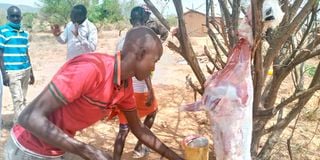Bush butcheries and neglect of West Pokot ward

A meat seller cutting meat at a bush butchery in Kotulupogh area in West Pokot county.
What you need to know:
- Masol is considered to be one of the most marginalised regions of Kenya.
- Kotulupogh has never had a butchery or abattoir since Kenya’s independence.
It is 10am on a Saturday, and the mid-morning sun still feels good on the skin.
In the bushes of Kutulupogh village in Masol ward, chunks of goat meat are dangling from a tree branch, with three men busy cutting them.
A crowd has gathered, ready to be served, as two other young men roast portions of meat on a three-stone fire.

Men roasting meat at a bush butchery in Kotulupogh, West Pokot County.
Not far away are elders on traditional stools (Apolong) sniffing tobacco. Leaves of the sorichon tree are spread out, acting as plates for serving the meat.
This is one of West Pokot County’s remote bush butcheries. Meat from these butcheries is said to be so tasty that it does not require salt.
Masol is on the West Pokot-Turkana counties border, more than 100 kilometres from Kapenguria. It is considered by many to be one of the most marginalised regions of Kenya.
Kotulupogh, which is about 30 kilometres from the Kitale-Lodwar road, has never had a butchery or abattoir six decades after Kenya’s independence and 12 years of devolution.
There is no sign of a permanent structure in Kotulupogh.
The sweetness of the local animals’ meat is attributed to the natural minerals in the region.
The livestock meat sector in the semi-arid Kotulupogh has a high potential.
Some 95 per cent of red meat and the most available source of animal protein is derived from livestock despite the hygiene challenges along the beef value chain.
Even with these problems, the meat selling point attracts hundreds of customers daily.
Some carry unwrapped meat to their homes.
Mr Raymond Lotudoreng, a resident, said Kotulupogh lacks social amenities.
“We slaughter cows and goats and sell the meat under trees. The word ‘butchery’ is a vocabulary,” he said.
According to Mr Lotudoreng, locals depend on meat, milk and blood. Coming across another type of meal is rare.
Kotulupogh residents usually know of the availability of meat by word of mouth or mobile phone.
The bush butcheries have no scales. The uninspected meat is weighed by hand.
“We just hear of meat inspection but don’t know what it entails. Life is very simple here. We don’t care much since God protects us,” Lotudoreng said.
West Pokot County Veterinary Services Director, Samuel Chelimo, explained why meat from Kotulupogh requires little or no salt when being cooked.

A man carrying home meat from a bush butchery in Kotulupogh, West Pokot County.
“It has natural nutrients and minerals,” Dr Chelimo said.
“It is tasty because of the vegetation the cows feed on. The red soil has an abundance of minerals.”
He added that the goats of Kotulupogh eat many herbs, giving the meat a unique flavour “and medicinal qualities”.
Mr Lokwakado Lomada, a trader, told the Daily Nation that he sells at least five goats a day.
“We are experts in weighing the meat using hands. We sell the meat in any quantity for any amount, starting from Sh20. We are experts in meat roasting too,” Lomada said.
Kotulupogh resident, Mary Loitangole, said the handling of beef at the bush butcheries is not hygienic and contributes to contamination.
Ms Loitangole added that distribution is the most critical period in meat production as that is the time quality can easily be compromised.
“I have never bought meat from a butchery,” she said.
Masol residents decry the neglect. The locals say Kotulupogh lags behind other areas in development to the history of cattle rustling and insecurity.
The conflicts saw Masol isolated for many years. It only reopened when peace was restored five years ago.
Residents have appealed for affirmative action, saying Masol is the most neglected ward in West Pokot County.
Sigor MP, Peter Lochakapong, says there is a need for more development in Masol. He says general banditry in West Pokot scares investors.





